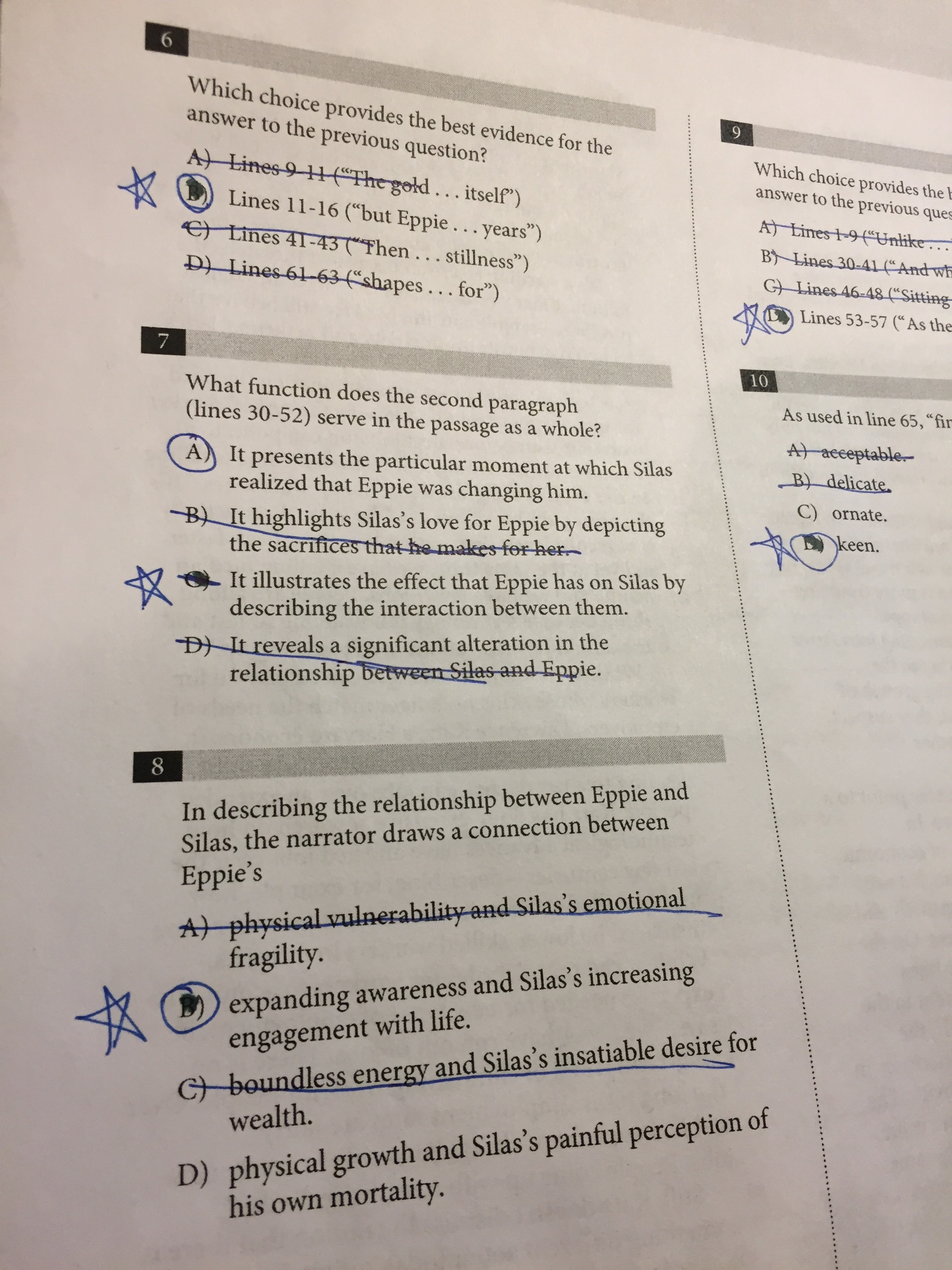Introduction
The SAT Reading section is a daunting prospect for many students. With its challenging passages, intricate vocabulary, and time constraints, it can seem like an insurmountable obstacle on the path to academic success. However, fret not! With a strategic approach, persistent practice, and an unwavering belief in your abilities, you can not only conquer this section but also achieve the coveted 800 score. This comprehensive guide will provide you with an arsenal of effective strategies, expert insights, and actionable tips to help you unlock your true potential and dominate the SAT Reading.

Image: www.reddit.com
Deciphering the SAT Reading Passages
The SAT Reading section comprises three types of passages: fiction, nonfiction, and social science. Fiction passages delve into imaginative worlds and captivating narratives, while nonfiction passages explore real-world events, ideas, and perspectives. Social science passages delve into human behavior, relationships, and social systems. To effectively comprehend these diverse passages, it is imperative to activate your prior knowledge, engage with the text actively, and make strategic annotations.
As you embark on your reading journey, cultivate a skeptical mindset, questioning the author’s purpose, tone, and main arguments. Identify the key ideas and supporting evidence. Consider the author’s perspective and how it may shape the interpretation of the text. By engaging in active reading, you will not only enhance your comprehension but also lay the groundwork for answering the subsequent questions accurately.
Expanding Your Vocabulary
The SAT Reading section is renowned for its sophisticated vocabulary. To tackle this challenge head-on, embark on a diligent vocabulary-building regimen. Utilize flashcards, engage with challenging texts, and delve into the etymology of words. Understanding the roots, prefixes, and suffixes of words will empower you to decipher even the most abstruse vocabulary encountered on the exam.
Incorporating vocabulary practice into your daily routine is essential for sustained progress. Set aside dedicated time each day to review flashcards or tackle vocabulary exercises. Utilize online resources, such as vocabulary apps or websites, to make the learning process interactive and engaging. By systematically expanding your vocabulary, you will not only enhance your SAT Reading performance but also broaden your linguistic horizons.
Mastering the SAT Reading Question Types
The SAT Reading section features a diverse range of question types, each designed to assess a specific reading skill. To excel in this section, it is imperative to become familiar with these question types and develop effective strategies for each.
Passage-based questions: These questions test your comprehension of the main idea, specific details, and supporting evidence within a passage. To answer these questions accurately, identify the key points and supporting evidence in the passage, and then eliminate answer choices that are not supported by the text.
Evidence-based questions: These questions require you to identify the specific line or paragraph in the passage that supports a given answer choice. To excel in these questions, develop your ability to locate relevant information within the text and understand how it relates to the answer choices.
Vocabulary-in-context questions: These questions test your ability to understand the meaning of unfamiliar words within the context of a passage. To answer these questions effectively, utilize your vocabulary knowledge and apply it to the specific context of the passage.
Inferences and author’s purpose questions: These questions assess your ability to make inferences based on the information in the passage and understand the author’s purpose. To master these questions, develop your critical thinking skills and practice identifying the author’s tone, bias, and main arguments.
Rhetorical analysis questions: These questions require you to analyze the author’s use of literary devices, such as irony, symbolism, and imagery. To excel in these questions, develop your analytical skills and practice identifying the author’s intended effects.

Image: www.hotzxgirl.com
Expert Insights and Time Management Techniques
Time management is a crucial aspect of the SAT Reading section. With only 65 minutes to complete 52 questions, it is essential to develop efficient time management strategies.
Budget your time: Allocate a specific amount of time to each passage based on its length and difficulty. This will help you avoid spending too much time on one passage and neglecting others.
Read actively: As you read, highlight key information, make notes, and annotate the text. This will save you time when you need to refer back to the passage to answer questions.
Eliminate answer choices: When answering questions, carefully evaluate each answer choice and eliminate those that are clearly incorrect. This will narrow down your options and increase your chances of selecting the correct answer.
Review your answers: If time permits, take a few minutes at the end of the section to review your answers and make any necessary changes. This final check can help you catch any errors you may have overlooked.
Stay Motivated and Seek Support
Preparing for the SAT Reading section can be a challenging endeavor, but it is essential to stay motivated throughout the process. Set realistic goals, track your progress, and reward yourself for your efforts. Surround yourself with a positive support system, including teachers, mentors, and friends who believe in you and can provide encouragement along the way.
If you encounter any challenges or plateaus, do not hesitate to seek help from your teachers or a professional tutor. They can provide valuable insights, tailored guidance, and the support you need to overcome obstacles and achieve your target score.
How To Get 800 On Sat Reading
Conclusion
Conquering the SAT Reading section and achieving an elite 800 score is a testament to your determination, hard work, and unwavering belief in your abilities. By implementing the strategies outlined in this comprehensive guide, seeking guidance from experts, and staying motivated throughout the preparation journey, you will not only overcome this challenge but also gain invaluable skills that will serve you well in your academic and personal life. Remember, with persistent effort and an unyielding spirit, you can unlock your true potential and achieve the success you aspire to.